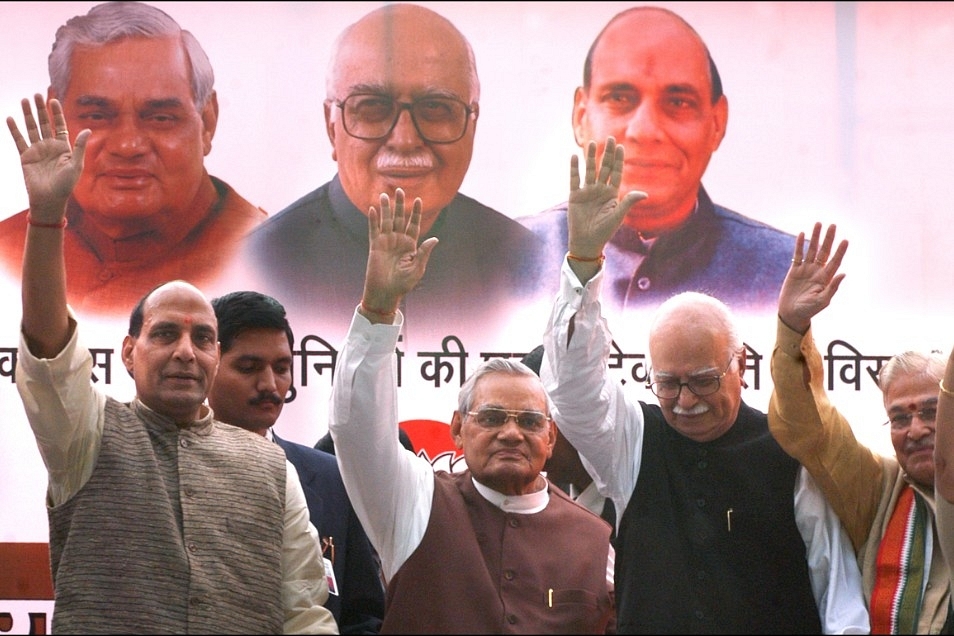Politics
It’s Not The Economy, Stupid: Electoral Outcomes Are Often Delinked From GDP Growth
- The BJP’s prospects in 2019 may not be hamstrung purely by moderate growth numbers.
- Success or failure depends on the narrative it manages to build when India goes to the polls.

The late Atal Bihari Vajpayee, senior BJP leaders L K Advani, Murli Manohar Joshi and Rajnath Singh. (Arvind Yadav/Hindustan Times via GettyImages)
What is the connection between the economic performance of a government and its re-election prospects?
Here are two opposing views on the same.
Swaminathan Anklesaria Aiyar, writing in The Times of India, believes that “lacklustre growth endangers Modi’s re-election”, pointing out that average gross domestic product (GDP) growth in the first four years of the National Democratic Alliance (NDA) government (7.35 per cent) has been no better than in the second stint of the United Progressive Alliance or UPA (7.39 per cent in 2009-14). He adds: “Rather than take courage in both hands and go for radical economic reform, Modi has opted for timid incrementalism. He hoped such incrementalism would add up over five years, ensuring re-election. That approach once seemed plausible. But not anymore.”
One presumes Aiyar meant to say that if reforms had come early in Narendra Modi’s tenure, growth would have spiked earlier and delivered by the end of the term. But Atal Bihari Vajpayee lost after a fairly reform-studded tenure. Nor did P V Narasimha Rao’s reforms deliver the Congress a victory in 1996.
So, the assumption that reforms may deliver healthy electoral outcomes for the party in power is questionable, at least going by the evidence of the last 30 years.
On the contrary, there is a view that states the exact opposite: that there is almost no connection between economic performance and electoral outcomes. Ruchir Sharma of Morgan Stanley, in an interview to The Economic Times, makes this point strongly. He said: “I’ve been working on my book about Indian elections and democracy. One firm conclusion after observing the elections for the last 25 years is that there is no connection in this country between economic development and political outcomes.”
While it would be foolish to argue that economic buoyancy has no connection to a party’s electoral prospects, the Indian experience does not allow us to come to any such conclusion. Other factors may often predominate.
In the 1989 general elections, after the economy registered its highest growth rate of 10.2 per cent in 1988-89, Rajiv Gandhi led his party to a massive defeat. Allegations of corruption, especially the Bofors case, did him in.
In 1991, when the economy was heading towards external bankruptcy, the Congress nearly made it back to power on its own – thanks to Rajiv Gandhi’s assassination. Again, the deciding factor was not the poor performance of the V P Singh government, but the emotive issue of the assassination. This despite the huge traction the Mandir and Mandal issues were giving to the opposition.
In 1996, despite front-loading reforms in 1991-92, and strongly reviving growth after 1992-93, the Congress lost.
In the United Front interregnum, two years of political confusion led to the first Vajpayee government, which lasted 13 months. But the second win of the Vajpayee-led NDA in 1999 was the result of the Kargil battlefield victory, and not any growth miracle.
In 2003-04, the Indian economy again rediscovered its mojo, and reported 8 per cent GDP growth, but the NDA lost the general election.
UPA-1’s stellar growth performance did deliver it a second term, but in its second tenure, growth fell. According to the reworked GDP back series, growth in UPA-2 averaged 7.39 per cent – which should not have been enough to defeat the coalition, but corruption probably did it in. Again, growth in itself does not seem to matter.
The evidence thus suggests that economic growth and reforms, while good to have, do not determine outcomes most of the time. Ruchir Sharma’s thesis seems more valid than Swaminathan Aiyar’s.
The Bharatiya Janata Party’s prospects in 2019 may, therefore, not be hamstrung purely by moderate growth numbers. Success or failure depends on the narrative it manages to build when India goes to the polls.
Support Swarajya's 50 Ground Reports Project & Sponsor A Story
Every general election Swarajya does a 50 ground reports project.
Aimed only at serious readers and those who appreciate the nuances of political undercurrents, the project provides a sense of India's electoral landscape. As you know, these reports are produced after considerable investment of travel, time and effort on the ground.
This time too we've kicked off the project in style and have covered over 30 constituencies already. If you're someone who appreciates such work and have enjoyed our coverage please consider sponsoring a ground report for just Rs 2999 to Rs 19,999 - it goes a long way in helping us produce more quality reportage.
You can also back this project by becoming a subscriber for as little as Rs 999 - so do click on this links and choose a plan that suits you and back us.
Click below to contribute.
Latest